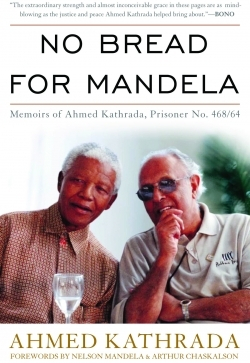No Bread for Mandela
Memoirs of Ahmed Kathrada, Prisoner No. 468/64
From 1652 to 1994, South Africa was ruled by a succession of white regimes notorious for exploiting the non-white population. Apartheid, imposed on the non-whites beginning in 1948, made life for blacks a living hell, and for Indians like Kathrada, a purgatory at best.
In the first part of his memoir, Kathrada, who was born in 1929, tells about his youth and street education as an activist, culminating in the 1963 Rivonia Trial, in which Kathrada, Nelson Mandela, and other freedom fighters received life sentences to Robben Island Prison, located off the Cape of Good Hope. Kathrada describes prison life as cold—“cold food, cold showers, cold winters, and cold cells.” Sadistic prison commanders believed that blacks did not need bread in their diets, hence the title of this book. Hours of hard labor chopping stones plus isolation from other prisoners and the outside world ensured inmates remained physically weak and hopeless.
Kathrada encouraged Mandela to write and smuggle from prison his international bestselling autobiography, Long Walk to Freedom, actions that cost Kathrada dearly. He spent twenty-six years in prison, and like Mandela refused early release more than once because it would have required him to give up his anti-apartheid protests. Kathrada was freed in 1989 and later served as a counselor to President Nelson Mandela from 1994 to1999. When Mandela turned Robben Island Prison into a national monument to those who fought for freedom, Kathrada was named chairman of the Robben Island Museum. Currently, Ahmed Kathrada is a board member of the foundation that bears his name and promotes non-racial programs.
Kathrada’s memoir joins a group of recent books about Nelson Mandela: Conversations With Myself, by Nelson Mandela, Young Mandela, by James Smith, and Mandela’s Way, by Richard Stengel. This book could have done with less detail of political meetings and court cases, and not until deep into the second part does the reader get much insight into Mandela (who wrote the foreword). Yet, Kathrada’s story is an important one that describes the persecution of Indians and all who opposed South African apartheid. It will appeal to serious readers of modern African history, and its lessons about the high cost of freedom and the heroes who paid its price will resonate with all.
Reviewed by
Karl Helicher
Disclosure: This article is not an endorsement, but a review. The publisher of this book provided free copies of the book to have their book reviewed by a professional reviewer. No fee was paid by the publisher for this review. Foreword Reviews only recommends books that we love. Foreword Magazine, Inc. is disclosing this in accordance with the Federal Trade Commission’s 16 CFR, Part 255.


